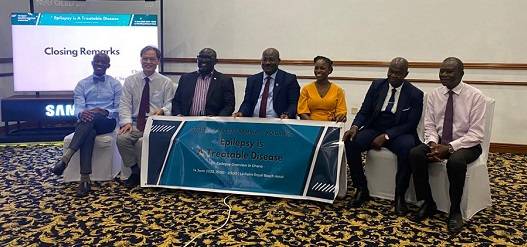
At least 191 children have been diagnosed with epilepsy within five months of this year at the Paediatric Neurodevelopmental Clinic at Korle Bu Teaching Hospital (KBTH) in Accra.
The cases recorded represent 27.4 per cent .
Epilepsy is a brain condition that causes a child to have seizures. It’s often caused by abnormal brain development or brain injuries, infection, inflammation, or specific gene mutations.
A Paediatrician at KBTH, Dr Hannah-Sharon Mills, said this on side-lines during a seminar on epilepsy organised by the Korea International Cooperation Agency (KOICA) in partnership with the Epilepsy Society of Ghana (ESG) in Accra last Friday.
She said from January to December last year, 443 patients out of the 1,462 patients at the clinic were diagnosed with paediatric epilepsy representing 30.3 per cent.
Dr Mills explained that the mortality rate in children with epilepsy was about 5 to 10 times higher as compared to adults with epilepsy which was about 2 to 4 times and the general population
“Paediatric epilepsy was one of the most chronic neurologic conditions in childhood with several co-morbidities such as learning difficulties, psychosocial issues, and behavioural problems among others,” she added.
Dr Hannah-Sharon stated that when children have epilepsy, it’s not only about managing the seizures but also managing their associated conditions which could be related to their cognition.
“Children with epilepsy can be managed adequately on antiseizure medications although some of them will have difficulty with treatment, they may require other forms of treatment such as surgery,” she added.
On ending the stigma surrounding persons with epilepsy and reducing the mortality rate, she stressed the need to educate communities about paediatric epilepsy, advocate for better resources and support services
She called for the continuous collaboration between healthcare professionals and organisations to encourage a positive outlook and quality of life for children with epilepsy.
The Deputy Director of the Mental Health division of the Ghana Health Service, Dr Amma Mpomaa Boadu stated that in efforts to manage epilepsy in the country, there had been an increase in the number of human resources such as training more primary healthcare providers to treat, diagnose and manage epilepsy.
“We have trained more specialists through Ghana and West African College of Physicians, improved diagnostics, availability of antiepileptics and even more effective medication with fewer side effects and the addition of epilepsy to the benefits of the National Health Insurance package,” she added.
She stated that although there had been significant success in handling Epilepsy in the country, there was still more that needed to be done such as having the requisite numbers and professionals to manage epilepsy.
She called for a broader stakeholder engagement on epilepsy as it transcends beyond the health sector with research and many others.
The KOICA Global doctor, Prof Eunik Son in his remarks called for proper education and awareness about epilepsy whilst underscoring the need for a comprehensive epilepsy centre at the various regional and district hospitals in the country.
BY JESSEL LARTEY THERSON-COFIE







